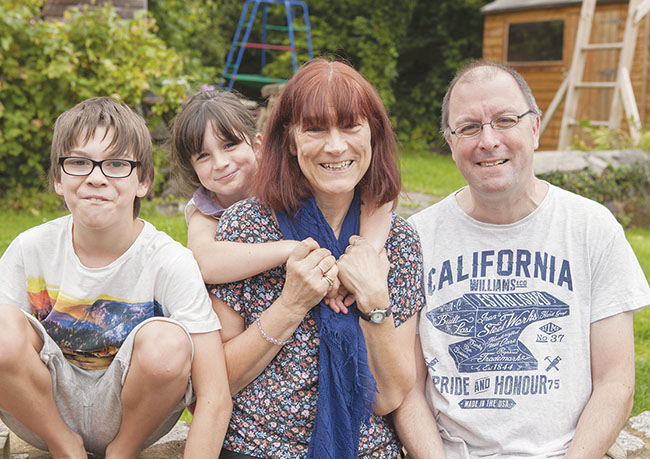
Lyn and her family are the driving force behind a new film aimed at helping younger children affected by Parkinson’s disease (a world first).
PICTURED: Lyn, Eif, Mael, and Amy
IT’S NOT just older people who have to deal with Parkinson’s disease.
The disease also affects younger adults – and can cause huge emotional pressures for their children, especially at school.
A new film is now helping teachers and health professionals to better understand the issues that can affect children whose parents live with the disease.
Mum of two Lyn Yearn, who has Parkinson’s, led the project with help from Plymouth University and Parkinson’s UK.
Listen to my Thoughts follows the experiences of Jess, a primary school pupil whose mum has Parkinson’s.
LYN FEARN lives with her husband Eif and children Mael, 12, and Amy, seven. She was diagnosed with Parkinson’s four years ago. Here’s her story
‘”PARKINSON’s caught up with me gradually. It started with losing my sense of smell, and then, as a teacher, I was finding it hard to write on the blackboard.
I began to walk with a limp, and was having problems managing simple things like putting my feet into wellies or keys in locks and doing buttons for the children.
Like most people, and some of the health professionals I saw, Parkinson’s was the last thing in my mind as a reason for all this. Surely I was too young to have the condition?
It took three years to get a diagnosis, and when it came it was a bombshell – we had even been told before by a neurologist it was not a serious problem, certainly nothing such as Parkinson’s.
We couldn’t think of what to say to the children. All they could see was us falling apart and we didn’t have the words. In fact, at the beginning we tried to hide it from them.
We got in touch with Parkinson’s UK who were brilliant and gave us some really use information and contacts. We were advised to tell the children, which we did.
Everyone makes plans and you think you’ll live forever and your future is bright, but it was like everything we were looking forward to had gone. I was a relatively young woman with children, which is unusual for Parkinson’s. Life had to go on. The children had to go to school and Eif had to go to work.
The children had a hard time at school, not through anyone’s fault but because the teachers had received no training or briefing on what to do in a situation like ours.
We told the school, but with staff changes the message just didn’t get passed on. Mael especially was struggling. He felt that he was responsible for me. He would go to school and worry all day and not learn anything. He got into trouble at school because no one understood what he was going through. There was no official support for him or for Amy.
As a teacher I realised that, at age four and eight, they simply didn’t have the language or the experience to explain how they felt or to process their feelings. Ours was a crisis for the children more than anyone – at that age they had no one in authority to turn to with the skills and expertise they needed.
There is little out there to explain Parkinson’s to young children, and what there is focuses on older relatives with the condition.
It was then that I got involved with the Peninsula Parkinson’s Excellence Network (PenPEN).
We decided that there was a need to develop resources not just for young children, but also for the professionals who interact with them. We wanted children to be heard, listened to and looked after. So, we developed the ‘Listen to my Thoughts’ film and leaflet (the name is actually something Mael said), with backing from Parkinson’s UK and invaluable input from PenPEN and Plymouth University.
As more young children are faced with this situation, it is not a problem that is going to go away. In some small way I hope that our film is the first step to ensuring that this is a problem of the past, and that there is a brighter future ahead for families touched by Parkinson’s.
- Parkinson’s is a degenerative neurological condition, for which there is no cure.
- The main symptoms are tremor, slowness of movement and rigidity.
- About 127,000 people in the UK.
- Most people who get Parkinson’s are aged 50 or over but younger people can get it too.
- Parkinson’s UK, tel 0808 800 0303
- Text relay: 18001 0808 800 0303
Listen to My Thoughts can be viewed at https://drive.google.com/open?id=0B_MoJySrabBvWjVUWFNiMHYtZXM

